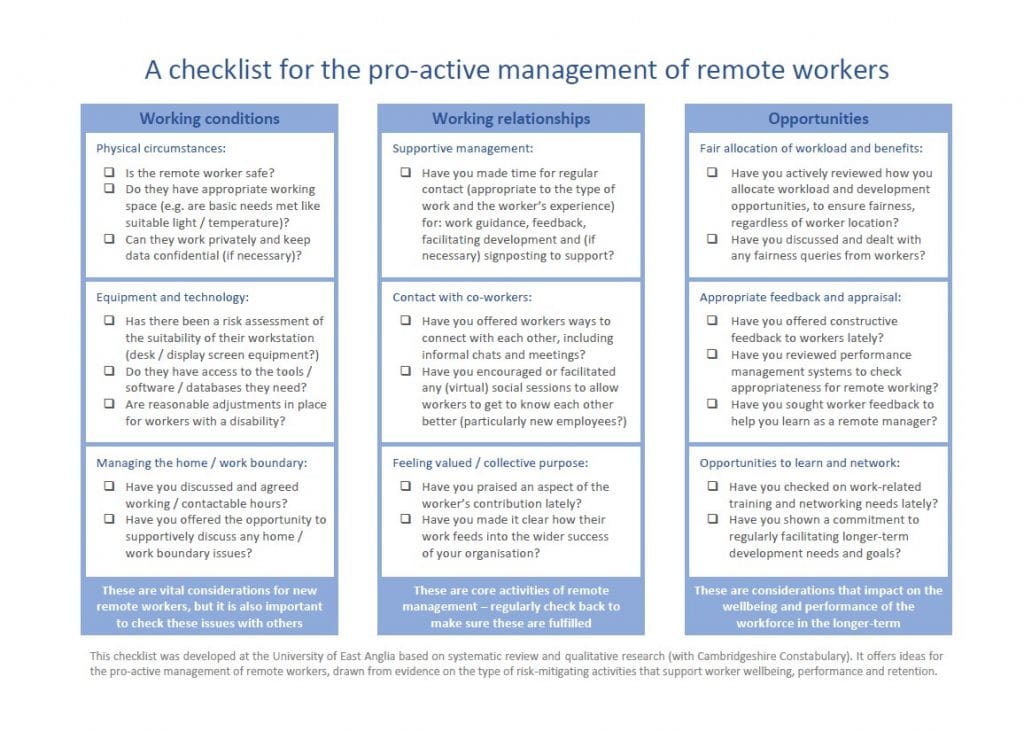Are you newly managing remote workers? Or managing remote workers far more than previously? You are not alone. Many people are learning that working and managing remotely feel different from face-to-face. We are identifying important implications for worker wellbeing and productivity. A new checklist from Norwich Business School at the University of East Anglia is available to provide ideas for the pro-active management of remote workers in the short, medium and long-term.
Why a checklist?
In his 2009 book The Checklist Manifesto, surgeon Atul Gawande made the persuasive argument that even very clever, very trained, very skilled people can make big mistakes in complex situations. This is because overlooking what may be a small routine step in a bigger process, especially in stressed or rushed conditions, can sometimes make the difference between preventing a problem or allowing it to snowball unnoticed. He showed how it was possible to drastically reduce mortality in surgery worldwide via the use of a checklist on just one side of A4.
The ambitions of our checklist on the pro-active management of remote workers are not quite as grand, but the ideas underpinning it are the same. You may (or may not!) already be a very clever, very trained, very skilled manager, but you may also find it useful to cast your eye over a checklist on one side of A4 to remind you of things you could do to support the wellbeing and productivity of your workers. Just as for skilled surgeons, there may be management actions that sound obvious when you are reminded of them, but which may slip your mind in tough times or in new situations.
Evidence-based
Our checklist offers useful ideas for pro-active management based on:
- Findings from research on the management of distributed workers, carried out by UEA for the Institute of Occupational Safety and Health
- Findings from a systematic review of reviews on the wellbeing and productivity challenges of isolated and confined working carried out by Dr Helen Fitzhugh and Professor Kevin Daniels for UEA at the start of UK lockdown 2020
- Findings from a mixed methods study with Cambridgeshire Constabulary of moving to more distributed and agile working in summer 2020 (not yet published)
- Comments and feedback from a range of professionals in the Eastern Region Wellbeing Taskforce.
The checklist is not exhaustive. Important management activities specific to sectors and worker circumstances cannot be detailed here. However, the checklist can be used as an aide memoire for areas on which to concentrate. By thinking about working conditions, relationships and opportunities in general, you can start to tailor your own specific approach, with the support of your Human Resources, Occupational Health and Continuing Professional Development colleagues.
Your organisation has responsibilities too
Making an effective checklist means being very focussed. This checklist is squarely targeted at people who are managing remote workers now. We want to help individuals think through their actions and support others. Yet, we also need to acknowledge important organisational responsibilities that also impact on worker wellbeing and productivity. Examples might be – how you recruit and select good remote managers, how you decide who should work at home or in the office or how you deal with issues such as equipment shortages during hybrid (home / office) working conditions. These are not issues for one manager, but for collective decision-making at the organisation level. The checklist cannot help with these directly, but the headings could still be used to prompt discussion at organisational level of any changes necessary for wellbeing and productivity.
Download the checklist here:
